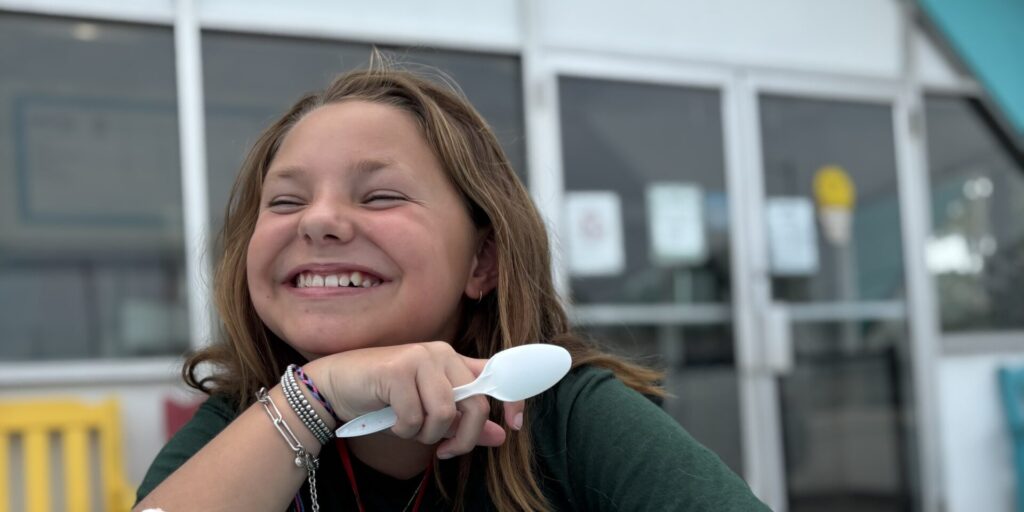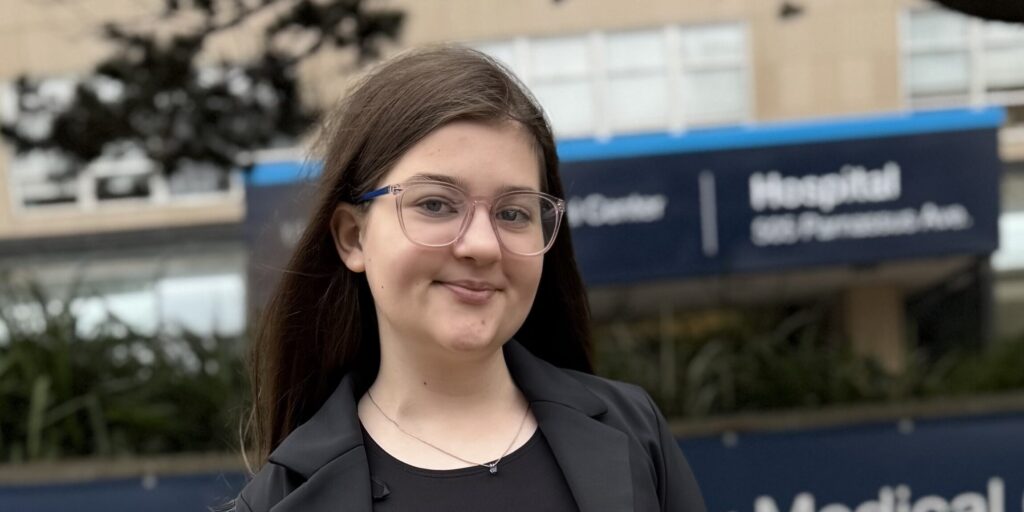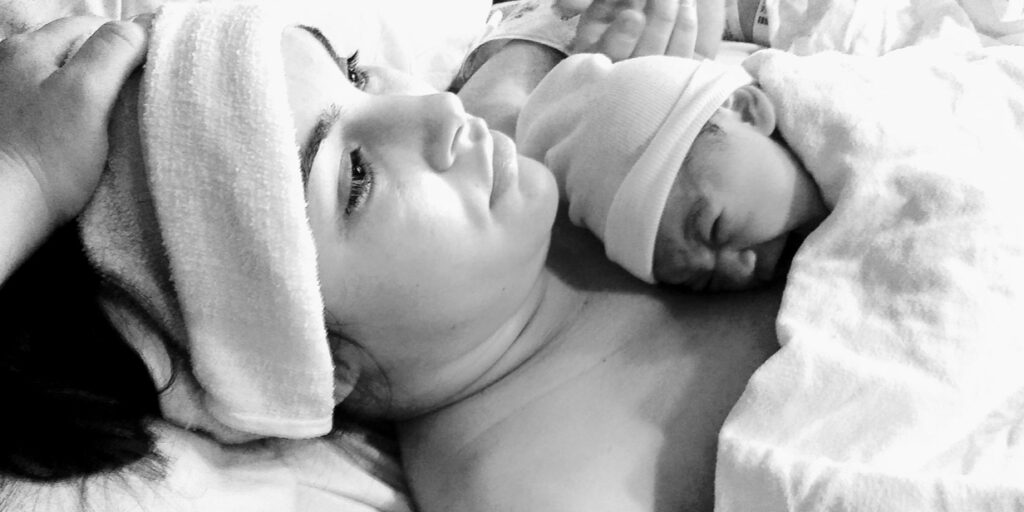
MDA Ambassador Guest Blog: The Joy of Motherhood
By Cassidy Nilles | Wednesday, May 8, 2024
5 Second Summary
MDA Ambassadors play an essential role in furthering MDA’s mission while representing and empowering the neuromuscular disease community. Quest Ambassador Guest Blog series provides a platform to share their personal stories, perspectives, and experience.
Cassidy Nilles is 34 years old and lives in Illinois. Cassidy lives with Limb Girdle muscular dystrophy (LGMD) type 2J. She lives with her daughter, Capri, and their 9-year-old maltipoo, Mila, in a ranch-style home that they share with her parents. After spending 10 years as a cosmetologist doing hair in both Los Angeles and Illinois, Cassidy is currently enjoying her role as a stay-at-home mom.
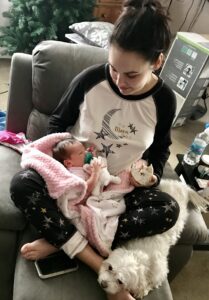
Cassidy Nilles holding her newborn daughter, Capri
For as long as I can remember, I dreamed of becoming a mother. Even as a little girl I was fascinated by pregnancy and would imagine what it would be like to one day be pregnant and raise my own family.
In my younger years I had mild symptoms of an undiagnosed neuromuscular disease, difficulty running, a different walk, and sometimes experienced physical pain from over exertion. It wasn’t until I was out of school and entering my adult life that I was finally diagnosed with Limb-Girdle muscular dystrophy. The diagnosis came as a complete shock, as no one in my family had ever had LGMD or any type of muscular dystrophy (MD). We also knew nothing about the disease, other than it was progressive and there was no cure. I had just started my career as a hairstylist and was not ready to accept this diagnosis as my new reality. Even though I learned that I would ultimately not be able to continue the career that I loved and would eventually lose the ability to walk, what I feared most was the possibility of not being able to carry and raise children of my own. At that time, there was not any information available on women with LGMD or MD going through pregnancy, giving birth, or raising their babies and children. For me to picture a future where I could not be a mother and experience all aspects of motherhood was debilitating.
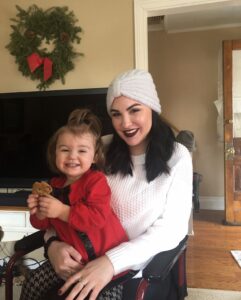
Cassidy Nilles holding her toddler, Capri
When I was 27, I was in a serious relationship and ended up getting pregnant unexpectedly. My partner and I were so excited when we found out, but also fearful of the unknown.
Around that time, I discovered a Facebook group called “Moms with MD” and it was a godsend! I was able to connect with women living with neuromuscular disease from all over the world, who had experienced pregnancy and birth along with raising children and everything in between. My obstetricians had never had a patient with MD before, but they didn’t treat my pregnancy as high risk, however I did receive care through maternal fetal medicine for scans. (Maternal fetal medicine is a specialty that generally offers expert care to mothers who are considered high-risk due to a health condition or because the infant may have a congenital anomaly. They typically provide genetic counseling, more in depth ultrasounds, and additional screening and testing.)
For the most part, I had a wonderful and fairly easy pregnancy until the later months when I lost my mobility and started using a wheelchair and needed much more assistance. We were ecstatic to find out I was having a little girl. I always dreamed of having a daughter!
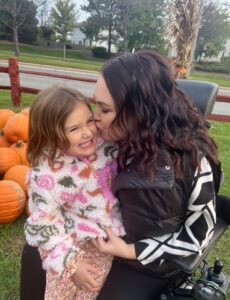
Cassidy Nilles holding her daughter, Capri
Since both my baby and I were healthy and there were no complications, I planned to have a natural (drug free) vaginal birth. Eight days past my due date I finally went into labor. After 11 hours of labor and 5 hours pushing (I don’t know how I did that, especially with MD), my beautiful daughter Capri Valentina was born: perfect and healthy!
Now I had to figure out how I was going to take care of a newborn having lost my mobility and exerted a lot of my strength giving birth. I exclusively breastfed Capri – it was certainly a challenge but also so worth it! I loved that this was one thing I could do for my baby that no one else could do for her. In the beginning, I needed a lot of help with things like changing diapers or clothes, baths, picking her up, and burping her; however, breastfeeding Capri was something only I could do. It was also an incredible bonding experience, and we made it over a year!
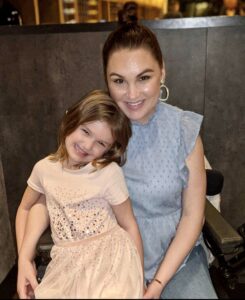
Cassidy Nilles holding her daughter, Capri
We spent a lot of time in bed in those early months. I was able to take naps with her, change her diapers, and feed her if we were in bed and she was right next to me. We could also do “tummy time” in my bed. Tummy Time is a supervised period of time during the day that babies spend on their stomach to practice holding up their head and build strength. It is a crucial exercise for baby’s motor, visual, and sensory development. Being able to do these important tasks together in my bed helped me to care for her independently.
We eventually moved into my parents’ house to have extra help. Capri grew and adapted to my abilities, she hit every milestone early and at 18 months was able to push me in my wheelchair! Of course, we have had lots of help from family and caregivers throughout the years. As they say, it takes a village! Being a mom with a disability has not been easy, but parenting inevitably always comes with challenges. And the challenges are worth every second. The love and bond that Capri and I share is like nothing I’ve ever experienced before. She has grown into a brilliant, strong, beautiful, creative, and very empathetic little girl. She is now 6 years old and about to graduate from kindergarten. We’re at a stage where we are able to start to break away from some of the assistance we once needed and can do more things just the two of us, like go to the park. I am also in the process of getting hand controls in my van so that Capri and I can go on more special adventures together.
Being Capri’s mom is my biggest accomplishment and the most rewarding and fulfilling part of my life. Despite the struggles I have faced, I am so grateful for this unique journey of motherhood that I am incredibly blessed to experience!
Next Steps and Useful Resources
- For more information about the signs and symptoms of Limb Girdle muscular dystrophy (LGMD) , as well an overview of diagnosis and treatment concerns, an in-depth review can be found here.
- To learn more about MDA’s Parenting Information, visit here.
- To learn more about MDA’s Mental Health Hub, visit here.
- MDA’s Resource Center provides support, guidance, and resources for patients and families. Contact the MDA Resource Center at 1-833-ASK-MDA1 or ResourceCenter@mdausa.org
- Stay up-to-date on Quest content! Subscribe to Quest Magazine and Newsletter.
Disclaimer: No content on this site should ever be used as a substitute for direct medical advice from your doctor or other qualified clinician.


